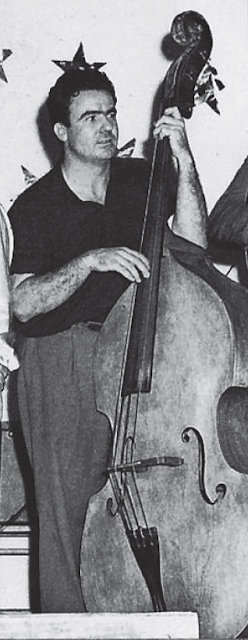The Indio label was founded by country and rockabilly singer Bill Carter in 1961. It was first located in Modesto, California, but moved to Emeryville soon after the first two releases.
Born on December 11, 1929, in Eagleton, Arkansas, Carter's family moved to Broken Bow, Oklahoma, when Carter was eight years old. A couple of years later, in 1943, the Carters once again changed homes and settled down in Idaho, California, where they made their living as farmers. At that time, Carter started his career as a singer and landed a spot on KREO in Indio (hence probably the name of his label).
From 1950 up to 1953, he served the US Air Force and upon his return, he made a guest appearance at Cottonseed Clark's TV show "Hoffman Hayride" and started his recording career. His first disc was released in 1954 on the 4 Star label ("Making Believe" / "More Than a Man Can Stand," 4 Star X 91). During the next years, he would record for such labels as Republic (1956), Tally (1957-1958), Black Jack, Showboat and Challenge (all 1959), Ozark, Honey B (both 1960), Checker (1960), D (1961) and others.
 |
Cal Veale (left) and Bill Carter holding a Jim Reeves record,
penned by Veale. |
Carter was also a DJ. He was on KBOX (Modesto) as well as KPIX (San Francisco) and appeared regularly at the Riverbank Clubhouse in Riverbank, California, in 1956. Around the time he recorded "Shot Four Times and Dy'in" / "Stranger, Shake Hands with a Fool" for D in 1961, he also founded Indio Records. One of Carter's business partners was Cal Veale, who acted as a producer and songwriter for the label. Veale had tried his luck in the recording business unsuccessfully in 1956, when he recorded one single with the Howard Reading Trio ("Don't Cry Baby" / "Standing on the Edge of Nowhere," Las Vegas #1237). Veale owned a recording studio in Modesto, where probably most of the Indio recordings were cut. Larry McGill, who had one release on Indio under his own name, also appeared on a couple of Indio releases as a songwriter. As Carter remembers, he played bass on many of the Indio recordings. Del Reeves was also at some point part of the studio band.
It appears almost all known releases were issued in 1961, as many Billboard reviews document. However, one disc is certainly from 1969 ("Camille" / "Now I'm a Star" by the Stage Hands, Indio #8692), judging from the Southern Plastics matrix code. At that time, Carter had already left the business, as he confirmed to me. The Stage Hands, which included Clyde Arnold, simply took label name and design from him. Arnold also wrote one of the songs, "Camille" and had recorded the classic "Black Smoke and Blue Tears" in 1961 for Indio. He was once described by Carter as a "leather jacketed hoodlum." This 1969 release, however, shows the label's location as Newark, California.
Nevertheless, Indio was a short-lived affair for Carter. He became a Christian in October that same year and turned to Gospel music. Nowadays, he is retired but has recorded some sides with his wife.
An interview with Bill Carter can be found here.
Discography
Indio IN-1
Jimmy North / Jack Mashburn Band
Leavin' Town (Jim Hostetter) / I Know I'm to Blame ()
A / B
1961
Indio IN-2
Ray Smith and his Oklahoma Outlaws
You've Heard About Texas (Ray Smith) / Bluer Than Blue (Ray Smith)
A / B
1961
Indio IN-3
Dave Miller with Joe Richie and the Impossibles
Froggy Went A'Rockin' (Arr. Dave Miller) / With You (Dave Miller)
A / B
1961
Indio IN-4
Bob Gordon with Slim Williams and the Blue Valley Boys
Why Make Believe (Bob Gordon) / It's Not Easy to Forget (Bob Gordon)
A / B
Indio 605
Ralph Hill with Roy Henderson and the Arkies
There Goes My Baby () / Sweet Love ()
Indio IN-606
Clyde Arnold
Black Smoke and Blue Tears (C. Arnold; C. Veale) / Livin' for Your Lovin' (C. Arnold; C. Veale; McGill)
A / B
1961
Indio IN-607
Larry McGill with the Echo-Tones
I Want a True Love () / I Only Wish ()
A / B
1961
Indio IN-608
Clint Marrs and the Saddle-ites
Love and Money (Clint Marrs) / A Million Memories (Bob Morphew)
A / B
Indio IN-609
Ruthe Dee
I Want a True Lover (Bill Carter; McGill) / Tears on the Rocks (Ruthe Dee)
A / B
Indio 8692
Stage Hands
Camille (Clyde Arnold) / Now I'm a Star (Nancy Tester)
SO: 7398 / SO: 7399 (Southern)
1969
Thanks to DrunkenHobo, Svein Martin Pedersen


















